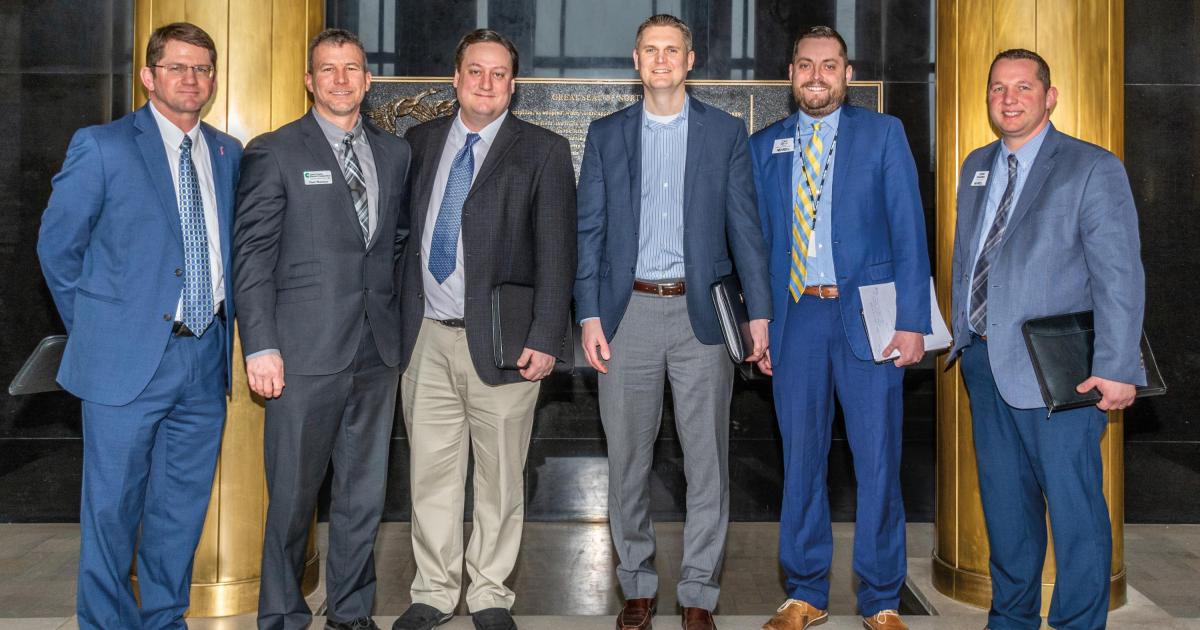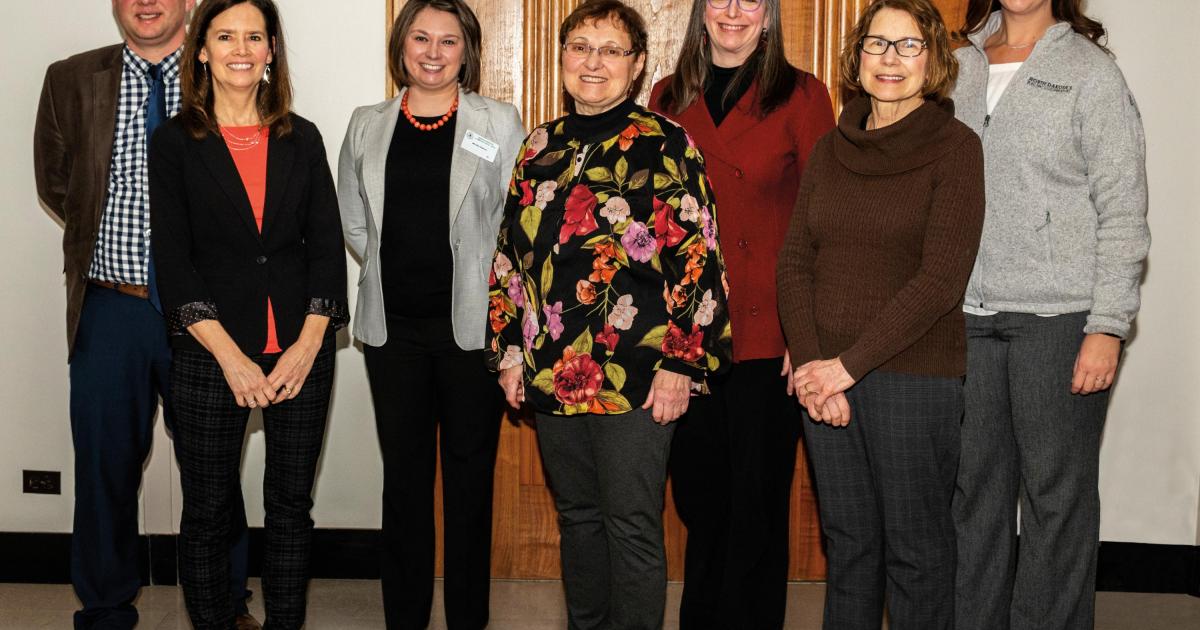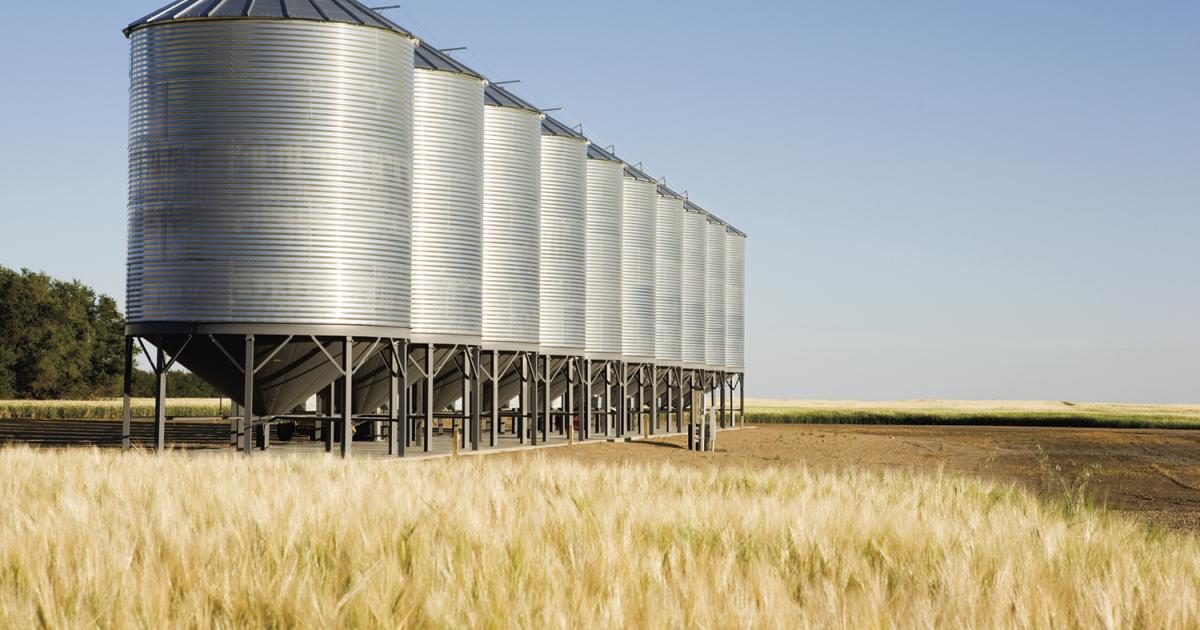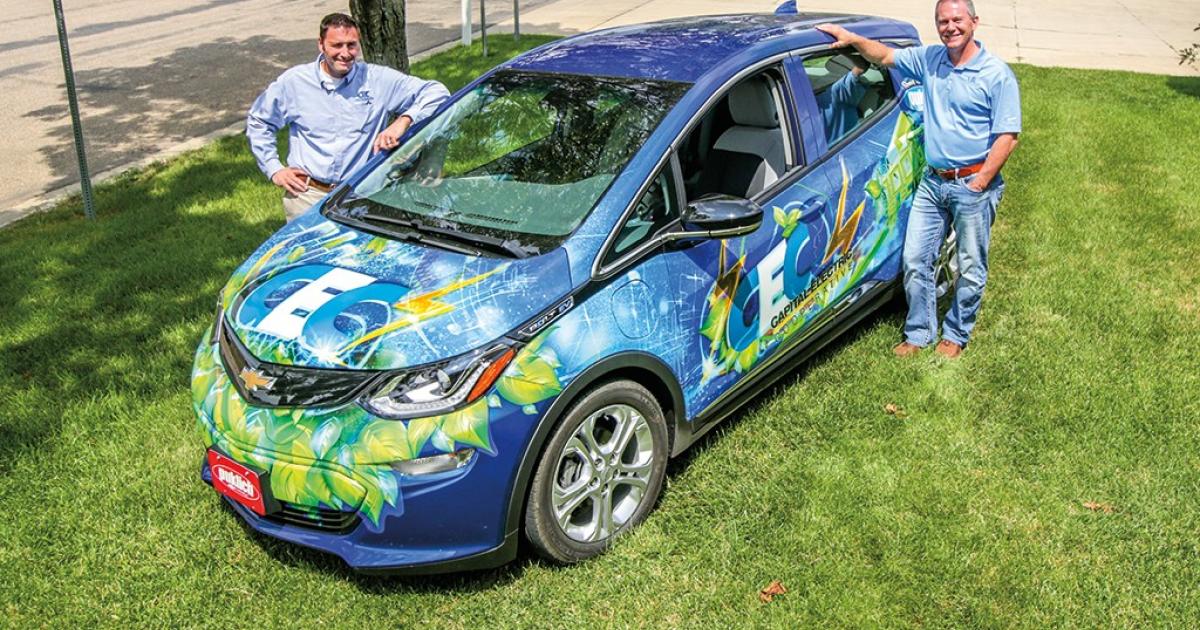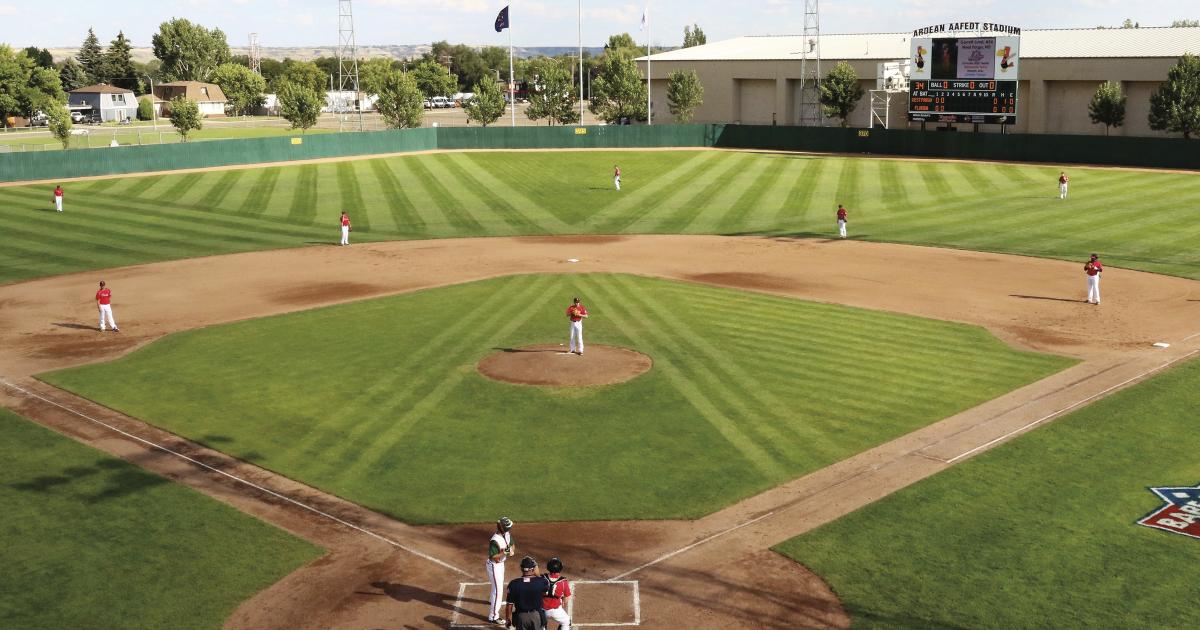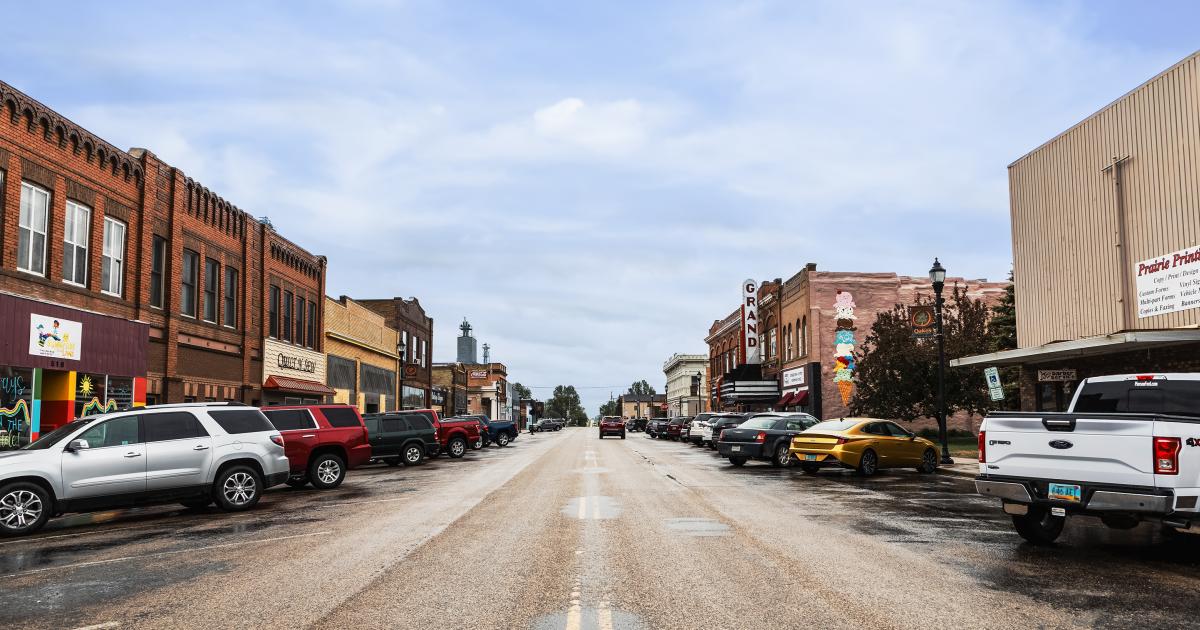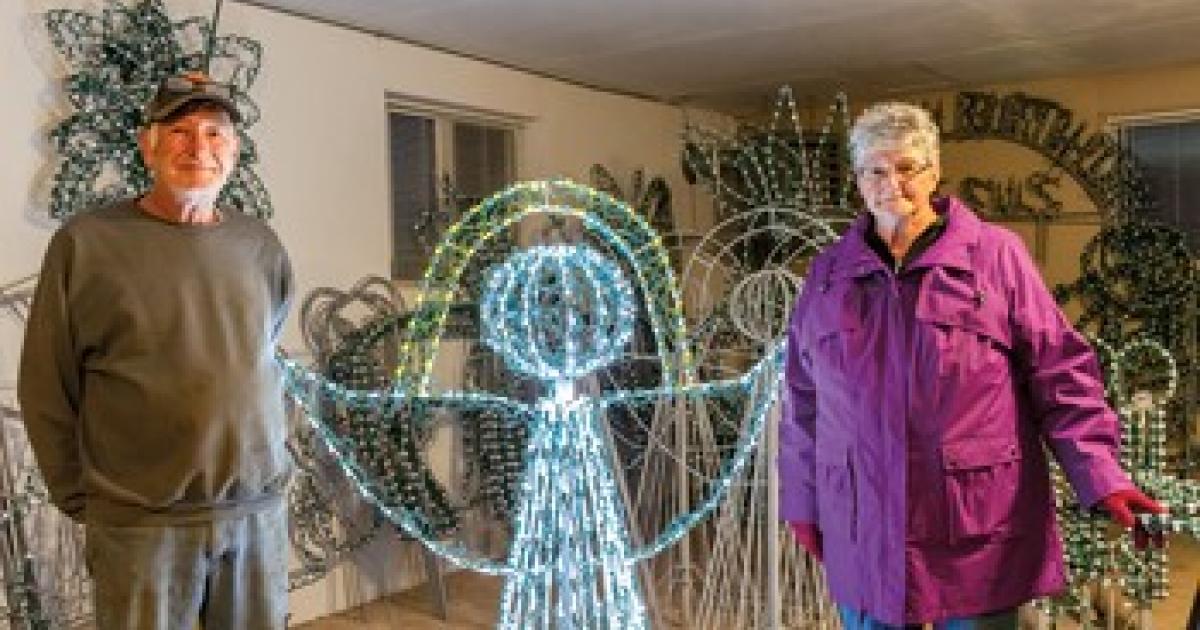The first four months of every odd year, Bismarck becomes somewhat of a boomtown. The population climbs as people flock to the state’s capital city to take part in the legislative process and make their voices heard on important issues.
It’s a busy time for not only the state’s 141 legislators, but for policymakers at each level of government and across organizations, including the North Dakota Association of Rural Electric Cooperatives (NDAREC).
Electric cooperative leaders stand for a photo in the North Dakota State Capitol Great Hall following a February 2019 legislative hearing on SB 2322, from left: Chris Baumgartner, Basin Electric Power Cooperative; Paul Matthys, Cass County Electric Cooperative; Tom Rafferty, Verendrye Electric Cooperative; Paul Fitterer, Capital Electric Cooperative; Zac Smith and Josh Kramer, NDAREC. NDAREC and member cooperatives opposed the bill, which was defeated in the Senate by a 7-39 vote.
Railroad crossings, easements, wind turbines and net metering are all on the docket this legislative session. “Being engaged in the legislative process is crucial for our organization,” says Zac Smith, communications and government relations director for NDAREC. “Not only does it give us a chance to tell our cooperative story, but it allows us to comment on industry issues.”
NET METERING, A MANDATE
One of the key bills NDAREC helped to defeat this session related to net metering. Net metering requires utilities, including electric cooperatives in many states, to buy excess electricity back from consumers who have some way of generating electricity themselves. That excess electricity could be produced by solar panels, a wind turbine or a portable generator. By far, the main source of this extra electricity comes from homeowners who have installed solar panels on their property.
Senate Bill (SB) 2322 would have mandated statewide net metering policies and transferred rate setting control to the Public Service Commission (PSC). Currently, those decisions are made at the local level, co-op by co-op. Many of North Dakota’s rural electric cooperatives have already adopted net metering policies and established programs to support renewables and energy efficiencies.
Net metering also presents an economic issue when considering fairness and equitability for all members, a cornerstone of the cooperative model. Essentially, net metering provides a subsidy to members who can afford a self-generating energy system, like solar panels, at a cost to other members, who pay a greater chunk of the electrical infrastructure costs. Summed up, a net metering installation uses the cooperative’s distribution system for a significantly reduced cost, while fellow members pay the full cost of service.
WHERE CO-OPS STAND
Because of these concerns, NDAREC formally opposed SB 2322 during a hearing held by the Senate Industry, Business and Labor Committee. In his testimony, Smith explained NDAREC’s philosophical and economic oppositions to the bill:
• Local, democratically elected co-op boards of directors are better suited to make decisions on rate issues, such as net metering, rather than the PSC.
• Co-op boards have always had the right and responsibility to set rates and terms of service for their customers.
• Each local co-op board is in the best position to determine what is efficient, fair and equitable for the cooperative and all its members.
• SB 2322 establishes an obligation for utilities to pay for excess distributed generation, such as solar or wind energy.
• Not only are net metering customers not paying their fair share of fixed costs, but they would actually take away revenues from the entity that provides the service.
Paul Matthys, vice president of member and energy services for Cass County Electric Cooperative (CCEC), and Tom Rafferty, member services and communications manager for Verendrye Electric Cooperative (VEC), provided additional testimony in opposition to the bill. Both gave examples of programs and activities their respective co-ops have implemented to support member interest in renewables and address conservation and energy efficiency.
In 2012, CCEC adopted a net billing program, which is like net metering in several ways. With net billing, consumers do not have the ability to “bank” excess energy and apply it to future energy purchases. Net billing programs provide a more equitable compensation to the net metered consumer without leaning on other consumers who don’t have solar panels or other ways to generate power at home.
As Matthys explained in his testimony, “The conversion to net billing will encourage members to consider renewable energy systems that are properly sized for their own energy use. One of the unintended consequences of net metering is that it provides an incentive to oversize renewable generation systems.”
CCEC also completed the first active community solar project in the state of North Dakota in 2016. Participating members of Prairie Sun Community Solar see solar energy credits on their monthly bills. To date, Matthys said the project is about 75 percent sold out.
For VEC, Rafferty said they, too, have a policy for various scales of consumer-owned generation. He also addressed the co-op’s financial concerns, “We have spent 80 years and hundreds of millions of dollars to build and maintain our system, and this bill would give members with financial means access to that infrastructure without us having control over the rates they would be paid.” Rafferty likened it to requiring grocery stores to buy produce from local producers at a price set by a third party.
Public Service Commissioner Brian Kroshus also offered neutral testimony on SB 2322, as is customary for state agencies to provide background and expertise on pending legislation. Kroshus asserted that the bill’s language would need to be improved. On potentially opening up the PSC’s jurisdiction over co-ops’ rates, Kroshus said, “Co-ops are best served through self-governance and self-regulation … and they do a very good job.”
RURAL FOOD ACCESS, A STUDY
NDAREC is also spotlighting the issue of food access in rural areas. Food access is considered an indicator of physical health and contributes to a community’s overall vitality, especially in rural America. Since 2013, 15 percent of North Dakota rural grocery stores have closed their doors in towns with populations of fewer than 2,100 people.
Senate Concurrent Resolution (SCR) 4013 would request the Legislature to study the issue of distribution and transporation of food in rural areas of the state, augmenting the work of the North Dakota Rural Grocery Initative, a project supported by NDAREC. In her testimony to the Senate Agriculture Committee, NDAREC Rural Development Director Lori Capouch said, “We believe there may be opportunities to improve the stability of our rural grocery sector through collaboration and public-private partnerships.”
Capouch continued, “We are here today because we have a concern for people and their communities. Access to food is a necessity, not a luxury.” SCR 4013 received a unanimous “Do Pass” recommendation from the committee and was adopted by the Senate.
Visit www.ndarec.com(link is external) for additional information on these issues or to learn more about NDAREC’s legislative priorities.
Cally Peterson is editor of North Dakota Living. She can be reached at cpeterson@ndarec.com.


